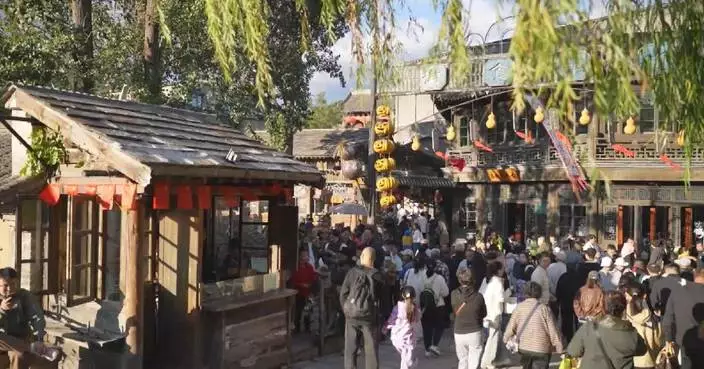Incessant monsoon rainfall since Friday has battered Nepal, rapidly raising the water level on major rivers across the country, leading to widespread severe road water-logging, and causing significant disruption to residents in the affected areas, according to Nepal's Department of Hydrology and Meteorology.
Kathmandu, the capital city of the South Asian country, has also seen flooding in the city's residential areas following the heavy rainfall.
"The weather on Saturday was very bad with continuous rainfall. The water level on the Bagmati River rose rapidly, flooding our entire nearby area," said Inder Adhikari, a resident of Kathmandu.
"The rainfall yesterday caused us significant losses. Some houses were inundated, and some were damaged," said local resident Raju Kumar.
The persistent heavy rainfall since Friday evening has created havoc across Nepal, leaving 15 dead, three missing and 18 others injured in landslides and floods triggered by the downpours as of 14:00 on Sunday. The rain began to lessen later Sunday.

Persistent rainfall pounds Nepal, disrupting traffic, causing widespread damage
A freelance writer from Australia has decided to become a permanent resident in China after living and working in Guangdong for 20 years, during which he has cycled through the country to see a real China and has witnessed the significant changes in the country.
Jerry Grey, 66, made his home in Zhongshan City of south China's Guangdong Province in 2004. The night he arrived in the city, he realized he had been misinformed about China.
"This used to be a supermarket. And my first day here, it was very late at night, 11, 12 o'clock at night. I got out of the car and walked through the supermarket and saw all the things that I carried with me from Australia. I had new shampoos and body washes and razor blades, all the things that I was told online you can't get these things in China, so you better buy them before you go. So I bought them all in Australia and carried them all to China. And I was misinformed. I didn't need to buy any of these things at all, because they're all cheaper here as well. I had to pay excess baggage in the airline because I was carrying so much weight. So that was a very strange experience. I also bought two bottles of Australian wine. And I can buy that in the supermarket, too," Grey said.
While serving as an English teacher at a foreign language school in Zhongshan, Grey spent a lot of his spare time traveling across China and fell in love with the welcoming people, beautiful landscapes, local cuisines, and a Chinese woman, who became his wife in 2009.
In 2014, Grey made a "crazy" decision to travel to Xinjiang by bicycle with a photographer friend, who is also a foreign expatriate.
"We left Zhongshan, traveled north into Hunan, and then Hubei, and then turned slightly northwest through Shaanxi, and then into Gansu, Ningxia, and across to Xinjiang. So that was quite an extended ride. That was 5,000 kilometers," Grey said.
It took them 57 days to finish that trip and finally see the magnificent views around Tianshan Mountains in Xinjiang.
"And the idea is that we want to see China. One of the most incredible things about riding a bike is the authenticity of the country, the real part of China," Grey said.
Grey has published a picture album titled "57 Days across China" to keep his memories alive and show people what he had seen during the journey. The funds raised from sales of the books have been used to help the people with disabilities in Zhongshan.
Over the past decade, Grey has ridden 35,000 kilometers in China, and his wife Liang Yuhua joined him in 2019.
In doing so, they have raised significant sums of money for people with disabilities and witnessed impressive changes in villages, where wide roads, modern home-stay hotels and restaurants have become common features in the past few years.
"In 2019, I noticed the significant changes when riding with Jerry. Especially, some rural areas are so clean that we didn't see any garbage. And the waste classification bins were placed neatly. So I told Jerry, 'see how great the changes that have happened in China over the years'," Liang said.
After retirement, Grey became a freelance writer. He has been posting videos on social media about what he has seen in China, including the Shenzhen-Zhongshan Link and the Village Basketball Association, an amateur rural basketball event that has become a nationwide sports phenomenon.
In recent years, Grey is impressed by the increasingly easier life in China, even for foreign travelers.
"So foreigners can actually open bank accounts in China. They can use WeChat and Alipay very, very simply as long as they're prepared before they arrive. Chinese payments are as convenient as it is possible to be," Grey said.
A few days ago, Grey went to the immigration office of Zhongshan and applied for a foreign permanent resident ID card.
"I think the time is right. I've lived here for 20 years, but for most of that time, I lived here on working permits and residence visas. Then when I retired from work, I'm on a spousal visa. And I think the time is right, because it gives me the card that I can travel around China without carrying my passport. And it becomes much more convenient. It's going quite smoothly. At the moment, we're waiting for the police checks to come back," he said.

Australian expat sees real China on bicycle










